Potato price surges during peak season
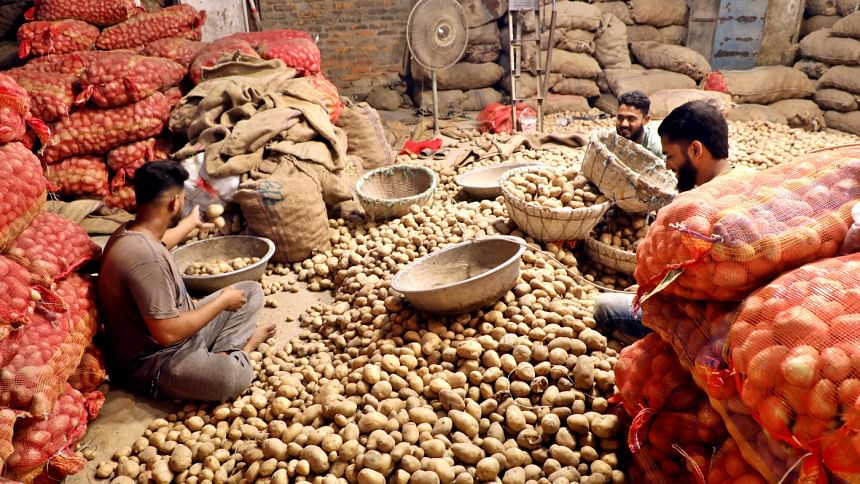
Potatoes are at least 50 percent costlier than a year ago owing to lower production, tight supply, and the profiteering tendency among a section of people in the supply chain, dealing a blow to the consumers already reeling under higher inflation.
The cultivation received the first blow in December last year when Cyclone Michaung-induced incessant rains hit the field crops. A fungal disease, known as late blight, has affected the production of one of the most-consumed vegetables in Bangladesh.
This has led to a supply squeeze at the beginning of the peak season for harvesting, according to officials of the Department of Agricultural Marketing (DAM), the Tuber Crops Research Centre, and traders.
Yesterday, potatoes were sold at Tk 45 to Tk 55 per kilogramme in the kitchen markets in the capital whereas it was Tk 32 to Tk 35 a year ago, data from the Trading Corporation of Bangladesh (TCB) showed.
In the last one month, the retail price has increased by 17.65 percent whereas the spike stood at 49.25 percent compared to a year earlier.
Mohammad Mansur Ali, a wholesaler in Karwan Bazar, one of the biggest kitchen markets in Dhaka, said he has bought potatoes at Tk 40 per kg and is selling them at Tk 43 to 44.
"The supply is lower than demand. Farmers have also raised the prices. Therefore, the potato is costlier even in the peak season."
Ali, who has been trading potatoes for over 38 years, said he had never seen such a price hike at a time when the market is supposed to see a supply glut.
Sadek Ali, a farmer of Dinajpur sadar upazila, cultivated the crop on five bighas of land. The late blight disease has affected the production.
"This resulted in a decrease of production by 30 percent."
In 2021-22 and 2022-23, Nur Islam, another farmer in the same upazila, sold potatoes at Tk 9 to Tk 10 per kg. This year, he is selling them at Tk 21, meaning a doubling of the price.
He grew potatoes on two bighas of land.
Matiar Rahman, director of the Tuber Crops Research Centre under state-run Bangladesh Agricultural Research Institute, said Cyclone Michaung hit when potato seeds were sown, affecting farmers. Many of them have not been able to recoup the losses.
Besides, due to supply shortages, some farmers sold pre-mature potatoes before the start of the season. As a result, the final production decreased, he said.
Mostafa Azad Chowdhury Babu, president of the Bangladesh Cold Storage Association, does not see the possibility of potato prices falling in the coming days.
There are 385 cold storages in the country. Of them, 192 are members of the association.
According to Babu, their members have a stock of 16 lakh tonnes while the non-members have about 10 lakh tonnes of the produce under their disposal.
Of the quantity, 40 percent are "seed" potatoes, which are used to grow new tubers. Five percent will be used in making chips and flakes while the rest are available for direct consumption, he said.
This year, the crop has been cultivated on 4.58 lakh hectares of land, figures from the Department of Agricultural Extension (DAE) showed. The harvesting season runs from February through April.
The state agency's target was to produce 1.16 crore tonnes of the crop. So far, 1.09 crore tonnes have been produced, said Tajul Islam Patwary, director of the Field Service Wing of the DAE.
The agriculture ministry puts the annual demand figure at 75 lakh to 80 lakh tonnes.
Patwary claims that there is no supply crunch in the market. "The tendency among a group of farmers to make an excessive profit has been among the reasons that have driven up prices."
The price of potatoes started to go up in September last year. In order to rein in the upward trend, the DAM fixed the "logical price" at the production, wholesale and retail levels.
However, the initiatives did not yield the expected results, prompting the government to allow imports in October. Still, the price has stayed at the elevated level.
According to the agriculture ministry, the government has given permission to import 5.3 lakh tonnes of potatoes. So far, 86,851 tonnes have been brought in.
Masud Karim, director-general of the DAM, said if traders import potatoes as per demand, the price will decline. "We are conducting mobile courts regularly to keep the price at a reasonable level."
AHM Shafiquzzaman, director-general of the Directorate of National Consumers' Right Protection, said they are aware of the high price of potatoes during the peak season.
He said there is a ministry-level meeting on the potato price on Tuesday. "Further steps will be taken after receiving instructions from the meeting."

 For all latest news, follow The Daily Star's Google News channel.
For all latest news, follow The Daily Star's Google News channel. 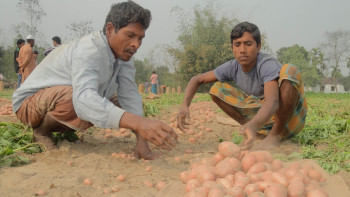



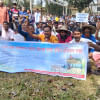
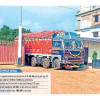
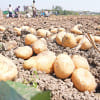
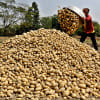


Comments